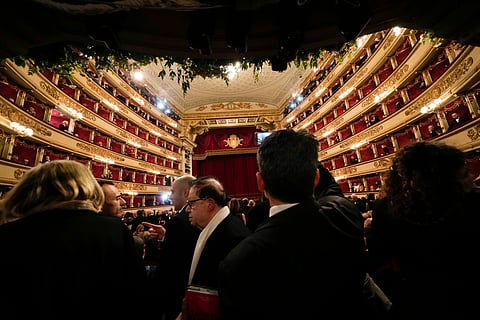
- LIFESTYLE
- FASHION
- FOOD
- ENTERTAINMENT
- EVENTS
- CULTURE
- VIDEOS
- WEB STORIES
- GALLERIES
- GADGETS
- CAR & BIKE
- SOCIETY
- TRAVEL
- NORTH EAST
- INDULGE CONNECT

Milan’s iconic Teatro alla Scala staged Giuseppe Verdi’s La Forza del Destino for its gala season premiere on Saturday, breaking a 59-year hiatus and challenging the opera’s reputation for being unlucky.
Under the baton of Riccardo Chailly, the production starred Russian soprano Anna Netrebko, American tenor Brian Jagde, and French baritone Ludovic Tézier. The performance garnered a standing ovation with 13 minutes of applause, though there were a few boos from the upper balconies.
Netrebko, unfazed by the mixed reception, quipped with an air kiss, “No one booed after my arias.”
The premiere, a staple of Milan’s cultural calendar, drew notable figures from politics, business, and the arts. However, this year, President Sergio Mattarella and Premier Giorgia Meloni were absent, attending the reopening ceremonies of Notre Dame Cathedral in Paris instead.
Netrebko played the role of Leonora, opposite Jagde’s Don Alvaro, star-crossed lovers whose lives are shattered by a tragic accident. Jagde stepped in on short notice, replacing German tenor Jonas Kaufmann, who withdrew due to family reasons.
Backstage, Jagde expressed his excitement: “I have never felt like this in my life. It’s exhilarating to be on stage here, with these people, on this day.” It was his fourth performance as Don Alvaro this year and his third appearance at La Scala, the second alongside Netrebko.
Netrebko described Verdi’s score as a “masterpiece” but admitted she struggled to connect with her character, Leonora, as a modern woman. “If you look at the story, it’s basically nonsense, sorry,” she said at a press conference. “Leonora is consumed by fear, guilt, and desperation. And in the end, what does she find?”
Set against the backdrop of war, the opera’s themes resonate with today’s global unrest. The event coincided with a pro-Palestinian protest that disrupted traffic in central Milan, while unions held their traditional demonstrations outside the opera house.
La Forza del Destino last opened La Scala’s season in 1965 and had not been performed by its orchestra for 25 years. The opera’s association with misfortune runs so deep that some Italians avoid saying its title aloud.
La Scala’s general manager, Dominique Meyer, dismissed the superstition as “folklore” and offered a more practical reason for its rarity: “Singers like Anna Netrebko are once-in-a-generation talents.”
Despite the opera's storied reputation, Meyer remained confident, stating, “We applaud folklore, but we stay calm.”